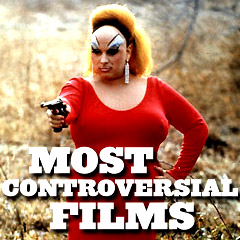
|
|
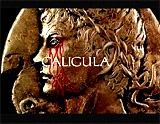
|
Caligula (1979, It./US)
This lavish Roman-Empire epic was the last major attempt of its era to include graphic sexual content in a mainstream film. It was written by Gore Vidal and co-financed by adult-oriented Penthouse magazine's producer Bob Guccione, though the script underwent several re-writes after the director and cast found Gore Vidal's interpretation unsatisfactory (Vidal later disowned it and removed his name). It advertised itself as "the most controversial film of the 20th century" - and was the most expensive pornographic film ever made. The objectionable film was originally intended by Guccione to be high-art (although it turned out to be excessive cinematic sleaze), with major and notable stars (Malcolm McDowell as the infamous, crazed and corrupt heir to the Roman throne, John Gielgud as Senator Nerva, Peter O'Toole as Tiberius, and Helen Mirren as promiscuous courtesan Caesonia), but was described as a "moral holocaust" by Variety and reviewers considered it worthless fantasy trash.
Hollywood's recent attempts to sensationalize antiquity, which owe some debt to Caligula, have found their way into feature films (such as Gladiator (2000), Troy (2004), Alexander (2004), and 300 (2007), and cable TV shows (such as Rome (2005-2007), Game of Thrones (2011-2019), and Spartacus (2010-2013)). This was Hollywood's first big-budget ($17.5 million that later ballooned to $22 million), bizarre blockbuster sexploitation epic of 'classy' hardcore sex and gory violence - and it became both a critical and commercial disaster after a very limited theatrical release (due to fear of prosecution for obscenity). Fearing an X rating, it was originally self-rated as MA (mature audiences only) and shown in a 156-minute version, but it was then severely edited for an R-rating down to about 102 minutes. This depraved movie, condemned as worthless fantasy trash, arrived just before the new conservatism that took place during the Reagan administration and its subsequent Meese Commission Study of Pornography (finally published in mid-1986). The film's director Tinto Brass had only one major film in his resume, Salon Kitty (1976) about a German brothel used by the Nazis. The film's plot followed the rise and fall of "Caligula" (Latin term meaning 'Little Boots') (Malcolm McDowell), the 24-year-old young heir to the throne of his grandfather - the syphilitic 77-year-old half-mad, depraved Emperor Tiberius (Peter O'Toole). Caligula was summoned to the island of Capri. He was accompanied by his sister Drusilla (Teresa Ann Savoy) with whom he was having an incestuous affair. Caligula was treated by Tiberius to a massive area where dozens of subjects were engaged in an orgy. The sordid film included graphic and steamy sex scenes of sexual depravity, degradation and orgiastic excess during the large-scale orgy, including a phallic swing, masturbation, rape, torture, genital mutilation, views of deformed freaks, among other thngs.
There were maneuverings behind the scenes to determine who would become the next emperor, due to Tiberius' ailing health. Caligula played a part in the drowning death of Tiberius' trusted Senator Nerva (John Gielgud), and also was complicit in the murder of Tiberius by the head of the Praetorian Guard Macro (Guido Mannan). Once attaining the emperorship, the ruthless Caligula had Macro's wife Ennia (Adriana Asti) arrested for "insubordination" and exiled to Gaul, while rival Macro was subjected to a mock-trial (for Tiberius' murder) and decapitated during a gruesome public execution. Caligula then went on a quest to find a wife, aided by Drusilla as they surveyed dozens of mostly-naked young females in a holding area - all priestesses of the goddess Isis. Disguised as a female, Caligula was intrigued by promiscuous divorcee Caesonia (Helen Mirren) and selected her as his mistress for rear-entry sex. Later, he chose to 'deflower' virginal Livia (Mirella D'Angelo), even though she was engaged to his loyal soldier Proculus (Donato Placido). He forced Proculus to watch Livia's first painful and bloody sexual intercourse, and then forced his friend to also partake, while 'fisting' him in the anus. He eventually schemed to rid himself of his rival Proculus - Caligula disemboweled and castrated him in a gory torture-murder.
While Caligula was making love to both Drusilla and Caesonia in a later threesome sequence, in a nearby bed chamber, two Isis priestess lesbians Messalina (Penthouse Pet Marjorie Thoreson (credited as Anneka Di Lorenzo)) and Agrippina (Penthouse Pet Lori Wagner) were engaged in explicit oral sex. [Note: The sequence was filmed at a different time and inserted for prurient interest.]
Caligula's fortunes and mental state began to take a turn toward paranoia and insanity as his behavior turned erratic and he acted tyranically without impunity against perceived rivals, the government, and even the gods. When Drusilla died of a fever (he reacted by dragging and carrying her nude body around the palace), and Caesonia bore him a daughter, he imagined the child was his son. He haphazardly executed Roman Senators, forced their wives and daughters into prostitution (in a large brothel-ship built in the palace - with an extended, second orgy sequence raunchier than the first one), senselessly declared war on Britain, and proclaimed that his horse Incitatus was a Senator. In January of 41 AD, a plot to assassinate the deranged and hated Caligula were in the making by a group of conspirators. As he returned to his Imperial Palace, Senator Chaerea (Paolo Bonacelli), head of the Praetorian Guard, mortally wounded Caligula with a sword, stabbed Caesonia, and murdered their child. A dim-witted Claudius (Giancaro Badessi) was hailed as the new Emperor. |
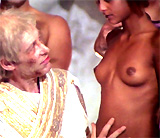 Tiberius (Peter O'Toole) with Slave Girl  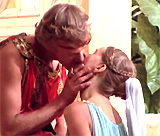 Caligula's (Malcolm McDowell) Incestuous Love Affair with Sister Drusilla (Teresa Ann Savoy) 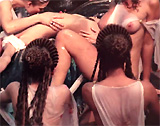 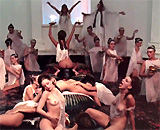 Priestesses of Isis - Possible Brides for Caligula 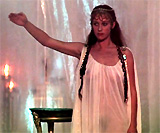 "Promiscuous" Courtesan Caesonia (Helen Mirren) Selected as Caligula's Mistress 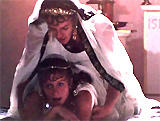 Caligula's Rear Entry Sex with Caesonia  Nude Caesonia - Caligula's Wife 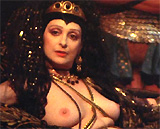 Ennia (Adriana Asti), the Wife of Praetorian Guard Head Macro (Guido Mannari) - Rejected as a Wife by Caligula, and Exiled 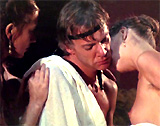 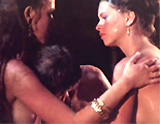 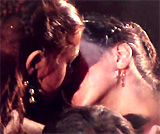 Caligula's Threesome with Caesonia and Drusilla 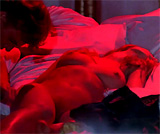 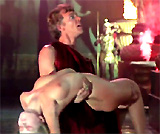 Drusilla Dead of a Fever 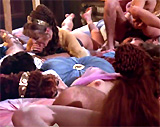 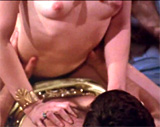 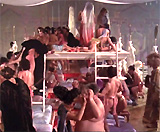 Ship-Brothel Sequence - Another Excuse for Extended Orgy |
||||||||||||||||||||||||
 
|
Monty Python's Life of Brian (1979, UK)
This Terry Jones-directed tasteless and daringly irreverent, pseudo-biblical satire of Biblical blockbuster religious films (from Cecil B. DeMille's works to Ben-Hur (1959)) and religious intolerance was often considered blasphemous and sacrilegious for its depiction of hypocritical faith, modern organized religion, and its religious zealotry and conformity. The film illustrated the kind of outrage that would come later for Martin Scorsese's film The Last Temptation of Christ (1988). Biblical history was rewritten in its parody story of reluctant Messiah Brian Cohen, a Jerusalem nobody and "very naughty boy" (according to his shrewish Jewish mother, whose life uncannily and coincidentally paralleled that of Jesus since he was born on the same day. A common misunderstanding was that Brian lampooned Christ or Christianity, but that was definitely not the case. Depictions of the figure of Jesus in the film were treated non-humorously and with respect, although the way in which Jesus was worshipped by followers was mocked. Self-appointed moral guardians criticized the idea of the film's production, until Beatles' George Harrison set up HandMade Films to finance it. [An hour-long UK TV documentary was made to chronicle the making of the film and the accusatory atmosphere surrounding it - The Secret Life of Brian (2007).] When released in the UK, the film -- regularly regarded as one of the funniest films ever made - was banned in some towns and counties by several town councils and organizations (one of which was Festival of Light), and efforts were taken to reclassify it as X-rated so that audiences would be further limited. It was also banned for eight years in the Republic of Ireland and for a year in Norway. The film was not released in Italy until 1990, eleven years after it was made. Various pressure groups in the US (especially in Bible Belt states) tried to prosecute the film or ban its showing, and Catholic groups condemned the film and suggested it was a sin to view it. Citizens Against Blasphemy attempted to prosecute the film. An animated title sequence featured a James Bond-like musical number and a "I love sheep!" scene with three Shepherds. After the titles, Three unwise Kings, astrologers from the East, erroneously visited infant Brian Cohen's (Graham Chapman) stable manger thinking he was the future King of the Jews - bringing gifts to an ungrateful, shrewish Jewish and Virgin mother Mandy (Terry Jones):
Mandy had a change of heart when they mentioned their gifts. They humorously discussed what myrrh was: ("It is a valuable balm" - misunderstood as a 'bomb'), and after realizing their mistake, the three decided to grab back their presents of gold, frankincense, and myrrh. In one scene, the Sermon on the Mount was lampooned - listeners were too far away to hear the real Jesus (Kenneth Colley) clearly when he delivered his well-known sermon from an inaudible distance, and they misunderstood and misinterpreted what they heard: ("Blessed are the cheesemakers" and "Blessed are the Greek...apparently he's going to inherit the Earth"). In the hysterical sequence of a "stoning," a group of women (disguised as men) anxiously awaited permission from an annoyed, weary Jewish Official (John Cleese) to stone a prisoner named Matthias: (Official: "You have been found guilty by the elders of the town of uttering the name of our Lord, and so, as a blasphemer, you are to be stoned to death"). They ended up stoning the official himself when he accidentally said Jehovah: ("I'm warning you. If you say Jehovah once more...!"), even though he cautioned everyone: ("Now, look! No one is to stone anyone until I blow this whistle! Do you understand?! Even, and I want to make this absolutely clear, even if they do say 'Jehovah'") - he ended up being crushed by a massive boulder. One of its ongoing gags was about the various factional, anti-Roman revolutionary groups (i.e., 'The Judean People's Front', 'The People's Front of Judea') that were protesting against Roman rule and occupation - and more often against each other. In the conjugation scene, a Centurion (John Cleese) caught Brian painting "Romanes Eunt Domus" on a wall [Romans Go Home] - and Brian received a lesson in proper Latin grammar for the graffiti, and by sunrise, had written out the corrected phrase 100 times on the palace wall: "Romani Ite Domum" (known as "The Graffiti Scene"). In the "What Have the Romans Done For Us?" scene, disgruntled Reg (Cleese) asked his commando followers: ("And what have they ever given us in return?") - and received numerous suggestions: the aqueduct, sanitation, the roads, irrigation, medicine, education, wine, public baths, public order, the fresh water system, public health - and peace! In the "Biggus Dickus" scene, lisping, effeminate Pontius Pilate (Michael Palin) was upset when he mentioned his friend Biggus Dickus (Chapman) and his guards began to snigger: ("I have a vewy good fwiend in Wome named 'Biggus Dickus'"). He taunted his men: "Anybody else feel like a little giggle when I mention my friend 'Biggus Dickus'? And what about you? Do you find it risible when I say the name 'Biggus Dickus'? He has a wife, you know. You know what she's called? She's called 'Incontinentia'. 'Incontinentia Buttocks'!"). Then, he ordered:
Brian was often mistaken for a prophet, and some insanely devoted followers worshipped Brian as the Messiah (one group worshipped a gourd he used, while another a sandal he lost while being chased). Brian made futile attempts to get rid of his followers. At one point, Brian fled from a crowd of crazed Messiah followers and jumped in a pit with Simon the Holy Man (Terry Jones). The hermit accidentally broke his vow of silence for 18 years when Brian landed on his foot. Brian repeatedly denied his Messiah-hood: ("Now, f--k off!"), when one of the men shouted back: ("How shall we f--k off, oh Lord?"). There were two full-frontal nudity scenes:
Brian's mother Mandy also assertively protested against the crowds: "He's not the Messiah, he's a very naughty boy!" - and "There's no Messiah in here. There's a mess all right, but no Messiah." The R-rated film's most controversial scene was the ending sequence of a mass crucifixion. A despondent Brian was crucified next to others, and was encouraged by fellow sufferer Mr. Frisbee (Eric Idle) to be cheerful:
The film ended with the incongruously upbeat, life-affirming comical song "(Always Look on the) Bright Side of Life." It was spiritedly led by Mr. Frisbee and performed by the chorus-line of dozens of crucified individuals, including Brian:
|
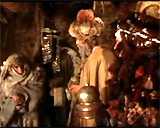 Three Unwise Kings at The Wrong Stable Manger 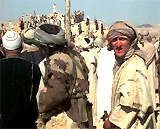 The Sermon on the Mount: "Blessed are the Cheesemakers" 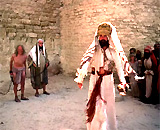 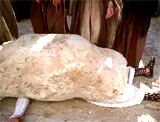 The Stoning Scene (Literally) of a Jewish Official 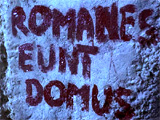 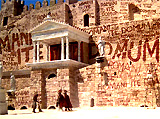 Lesson on Proper Latin Grammar 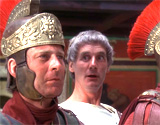 The "Biggus Dickus" Scene 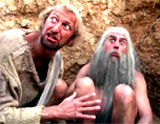 Brian with Simon the Holy Man 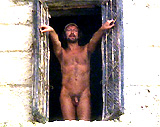 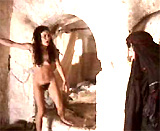 Brian with Welsh Tart Judith Iscariot 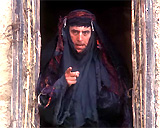 Brian's Mother Mandy: "He's not the Messiah, he's a very naughty boy!" 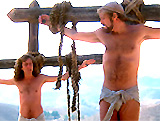 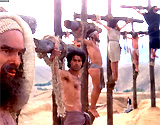 Ending: Crucifixion Scene ("Always Look on the Bright Side of Life") |
||||||||||||||||||||||||
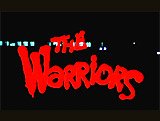
|
The Warriors (1979)
Writer/director Walter Hill's urban fantasy cult movie (his third feature film), an action-crime film, was a modern retelling inspired by the Greek tale Anabasis by Xenophon. This controversial film told the story of a number of gangs (approximately 100) who were invited to attend a midnight truce meeting - unarmed ("unpacked") - with other gang members in Van Cortlandt Park in the West Bronx. Most of the filming was on-location, shot overnight from dusk to dawn, and the film shoot quickly went over-budget and over-schedule. On a budget of about $4-7 million, the film successfully grossed $22.5 million. The film gained a cult following after its initial theatrical release when the cable TV and the VCR revolution occurred, and through midnight showings. It was a surprise hit, although it had a large cast of unknown actors from the New York theater area, and it presented a cartoonish-like, sylized display of violence (without blood) and an unrealistic view of NY street gangs. The film's original poster, which stated the film's tagline, outraged and scared many people:
Some of the film's early showings incited lethal violence (in Palm Springs and Oxnard, CA, and also in Boston) and caused gang outbreaks. Due to these reports of criminal violence in a few locations, the film was temporarily pulled out of circulation in over half a dozen theaters by its nervous Paramount Studios despite being a box office success. A number of theaters were forced to hire full time security until the end of the film's run. Paramount also attempted to modify the film's advertising campaign by pulling its print and TV advertising, but then was compelled to remove the film from release entirely.
Stranded in the West Bronx, the Warriors encountered one gang or group after another:
|
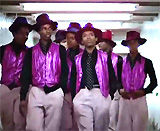 The Boppers 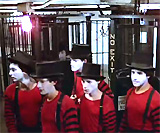 The Hi-Hats (Dressed Like Mimes) 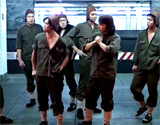 The Savage Huns 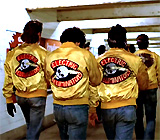 The Electric Eliminators 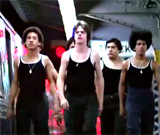 The Saracens 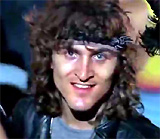 Luther (David Patrick
Kelly) - Leader of The Rogues Luther (David Patrick
Kelly) - Leader of The Rogues 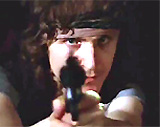 Luther's Assassination of Cyrus During Speech 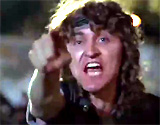 Luther's Framing of Warriors' Leader Cleon For Cyrus' Death  Gramercy Riffs' Replacement Leader: Masai, Wearing Black 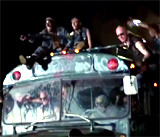 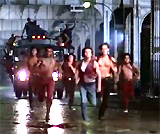 The Turnbull ACs Gang Bus Pursuing the Warriors on Broadway to a Subway Station 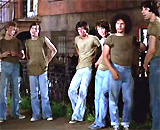 The Orphans, Led by Sully (Paul Greco) 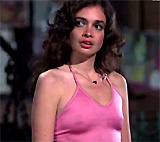 Orphans Member Mercy (Deborah Van Valkenburgh) 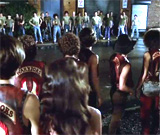 Stand-Off: Orphans vs. Warriors 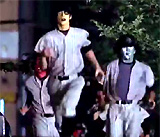 The Baseball Furies 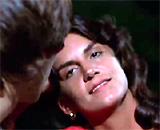 Warriors' Ajax (James Remar) Arrested by Undercover Cop (Mercedes Ruehl) in a Park 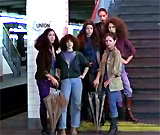 The All-Female Gang The Lizzies 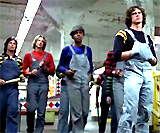 The Punks in Union Square Station 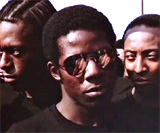 At Coney Island, New Riffs' Leader Masai to Warriors' Swan: "You Warriors are good, real good" 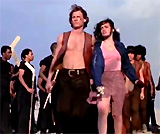 The Warriors Gang Was Finally Triumphant |
||||||||||||||||||||||||
(chronologically, by film title) Intro | Silents-1930s | 1940s-1950s | 1960-1961 | 1962-1967 | 1968-1969 1970-1971 | 1972 | 1973-1974 | 1975 | 1976-1977 | 1978 | 1979 1980-1982 | 1983-1986 | 1987-1989 | 1990-1992 | 1993-1995 | 1996-1999 2000-2002 | 2003-2005 | 2006-2009 | 2010-present |